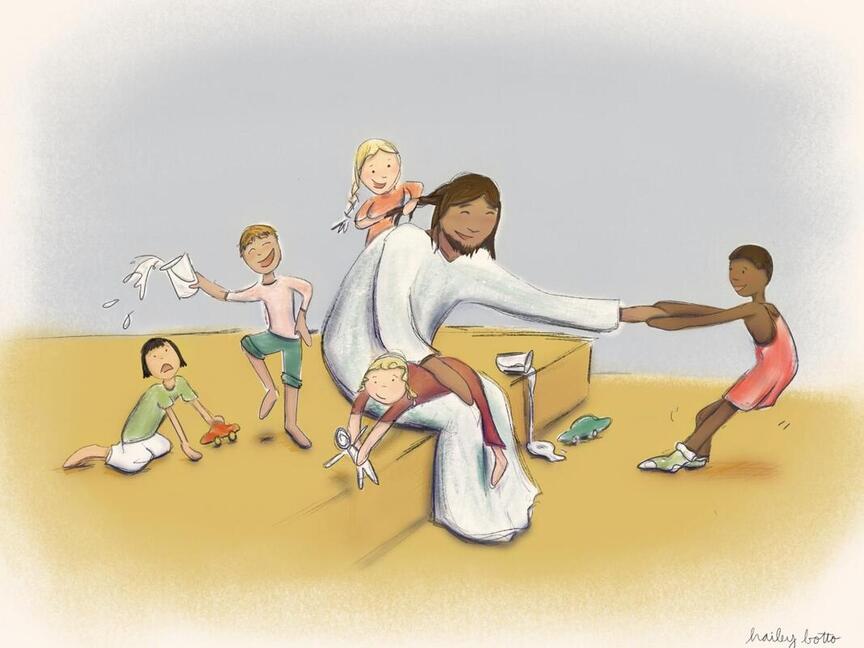|
Giving and Believing |
Twenty-Fourth Sunday after Pentecost- Week of Nov 7, 2021 - Proper 27
Don't forget to set your clocks back this Sunday!
Praying
Begin your devotion time by praying this prayer: God of compassion, you hear us when we pray to you. Teach us to pray in both joy and sorrow, and remind us of your presence, even in moments of sadness and grief. Amen.
Reflect on the Way of Love together: This week's practice on the Way of Love is PRAY. When you are happy, what kind of prayers do you pray? When you are sad, what kind of prayers do you pray? How are these prayers alike, and how are they different?
Reflect on the Way of Love together: This week's practice on the Way of Love is PRAY. When you are happy, what kind of prayers do you pray? When you are sad, what kind of prayers do you pray? How are these prayers alike, and how are they different?
preparing
Children have more agency and greater influence today than any other period in human history. Yet, they still remain vulnerable. They depend on adults to care for them, to provide their basic needs, and to keep them safe. It is exactly this vulnerability that draws Jesus to the children who seek his blessing. In this lesson, children will explore what it meant to be a young person in ancient Israel as well as the ways they can support vulnerable children in today’s world.
Begin the time with your children by asking them to imagine that they trade roles with their parents or caretakers for a week. They would do everything the adults normally do and the adults would become like children. What would it be like to take care of all of the household responsibilities, go to work and care for the adults? What might make this fun? What would make this challenging? Would they rather take on the adult roles or continue being kids? Note that children need time to develop. Adults know it is important for children to grow up, so they provide what the kids need to ensure they can focus on being kids.
Prepare to read Mark 12:38-44 aloud.
First, provide context for the passage. (If you explored Mark 9:30-37 with the group a few weeks ago, you can recap the message of that text.) Explain that children were not seen the same way in Jesus’ time as they are today. Children were the least important people in that culture. They had to be cared for and couldn’t provide much help to their families. They had little protection, making them vulnerable. Encourage the children to keep this in mind as you read the Scripture.
Begin the time with your children by asking them to imagine that they trade roles with their parents or caretakers for a week. They would do everything the adults normally do and the adults would become like children. What would it be like to take care of all of the household responsibilities, go to work and care for the adults? What might make this fun? What would make this challenging? Would they rather take on the adult roles or continue being kids? Note that children need time to develop. Adults know it is important for children to grow up, so they provide what the kids need to ensure they can focus on being kids.
Prepare to read Mark 12:38-44 aloud.
First, provide context for the passage. (If you explored Mark 9:30-37 with the group a few weeks ago, you can recap the message of that text.) Explain that children were not seen the same way in Jesus’ time as they are today. Children were the least important people in that culture. They had to be cared for and couldn’t provide much help to their families. They had little protection, making them vulnerable. Encourage the children to keep this in mind as you read the Scripture.
Readings
Mark 12:38-44
The Widow's Offering
As he taught, he said, "Beware of the scribes, who like to walk around in long robes, and to be greeted with respect in the marketplaces, and to have the best seats in the synagogues and places of honor at banquets! They devour widows' houses and for the sake of appearance say long prayers. They will receive the greater condemnation." He sat down opposite the treasury, and watched the crowd putting money into the treasury. Many rich people put in large sums. A poor widow came and put in two small copper coins, which are worth a penny. Then he called his disciples and said to them, "Truly I tell you, this poor widow has put in more than all those who are contributing to the treasury. For all of them have contributed out of their abundance; but she out of her poverty has put in everything she had, all she had to lve on."
The Widow's Offering
As he taught, he said, "Beware of the scribes, who like to walk around in long robes, and to be greeted with respect in the marketplaces, and to have the best seats in the synagogues and places of honor at banquets! They devour widows' houses and for the sake of appearance say long prayers. They will receive the greater condemnation." He sat down opposite the treasury, and watched the crowd putting money into the treasury. Many rich people put in large sums. A poor widow came and put in two small copper coins, which are worth a penny. Then he called his disciples and said to them, "Truly I tell you, this poor widow has put in more than all those who are contributing to the treasury. For all of them have contributed out of their abundance; but she out of her poverty has put in everything she had, all she had to lve on."
Four minutes to watch this Godly Play Story for this week.
Reflecting and Responding
Adults and small children
Read John 12:32-44 aloud.
Reflect: Sad things happen in our lives from time to time. Maybe a friend you love moved away or someone you love died. When we feel sad, so do the people around us. Jesus cried when he heard that Lazarus had died. He was cried because he loved Lazarus and also because he sees that Mary is sad. He loved all the people around them very deeply, so much that he wept when they wept.In this story, Jesus brings Lazarus back from the dead. That will probably never happen to us, but God can still be with us when we are sad or when we lose someone we love. Jesus shows us that it’s OK to be sad. That God and the people who love us are always there beside us, whether we are happy or angry, sad or joyful.
Respond: In church, we celebrate a special feast day called All Saints. It’s a day when we remember people who have died. Is there anyone you love that you miss? Maybe you just haven’t seen them in a long time. Find a picture of them, or draw a picture. Then post it on the wall. Sit next to it for a while and remember all the good things about them. Think about how much you love them. Have an adult sit with you. Remember that they are still with you in your heart, and that God is with you, too.
Reflect: Sad things happen in our lives from time to time. Maybe a friend you love moved away or someone you love died. When we feel sad, so do the people around us. Jesus cried when he heard that Lazarus had died. He was cried because he loved Lazarus and also because he sees that Mary is sad. He loved all the people around them very deeply, so much that he wept when they wept.In this story, Jesus brings Lazarus back from the dead. That will probably never happen to us, but God can still be with us when we are sad or when we lose someone we love. Jesus shows us that it’s OK to be sad. That God and the people who love us are always there beside us, whether we are happy or angry, sad or joyful.
Respond: In church, we celebrate a special feast day called All Saints. It’s a day when we remember people who have died. Is there anyone you love that you miss? Maybe you just haven’t seen them in a long time. Find a picture of them, or draw a picture. Then post it on the wall. Sit next to it for a while and remember all the good things about them. Think about how much you love them. Have an adult sit with you. Remember that they are still with you in your heart, and that God is with you, too.
adults and older children
Read John 12:32-44 aloud.
Reflect: When Mary’s brother, Lazarus, dies, she tells Jesus exactly how she feels. She is sad, angry, and hurt. She even accuses Jesus of not being there – blaming him for Lazarus’ death. A lot of the time, when we pray, we think we have to just say nice things – say thank you to God, or praise God for the good things in our life. But there are parts of our lives that are hard and scary, too.Mary is able to talk to Jesus so openly because she knows him. She trusts that it’s okay to have hard conversations, and to say what she really thinks. She trusts that Jesus will still love her, even if she’s not just happy and nice all the time.
Part of being a human is having to deal with losing people we love. We face hard things all the time – things that make us feel alone, scared, sad, or angry. These emotions are just a part of life – and God wants us to share our lives through prayer.
Respond: When someone dies, we can feel a mix of emotions. Mary felt angry with Jesus because her brother died – and maybe that’s something you can understand. Have you ever felt mad at God? Or wondered why God let something bad happen to someone you love?When we have those hard feelings, it’s okay to take them to God in prayer. All prayers don’t need to be about just happy or easy emotions. We can tell God when we’re sad, or angry, or scared, or confused.
What are some times when you’ve doubted God, or wondered why God let something happen? Talk about that time with someone you trust, a family member or close friend. Ask them to help pray with you about it, and bring all of the hard feelings to God. Don’t worry about saying something wrong, because God loves and accepts ALL of you – even the parts that feel hard.
Reflect: When Mary’s brother, Lazarus, dies, she tells Jesus exactly how she feels. She is sad, angry, and hurt. She even accuses Jesus of not being there – blaming him for Lazarus’ death. A lot of the time, when we pray, we think we have to just say nice things – say thank you to God, or praise God for the good things in our life. But there are parts of our lives that are hard and scary, too.Mary is able to talk to Jesus so openly because she knows him. She trusts that it’s okay to have hard conversations, and to say what she really thinks. She trusts that Jesus will still love her, even if she’s not just happy and nice all the time.
Part of being a human is having to deal with losing people we love. We face hard things all the time – things that make us feel alone, scared, sad, or angry. These emotions are just a part of life – and God wants us to share our lives through prayer.
Respond: When someone dies, we can feel a mix of emotions. Mary felt angry with Jesus because her brother died – and maybe that’s something you can understand. Have you ever felt mad at God? Or wondered why God let something bad happen to someone you love?When we have those hard feelings, it’s okay to take them to God in prayer. All prayers don’t need to be about just happy or easy emotions. We can tell God when we’re sad, or angry, or scared, or confused.
What are some times when you’ve doubted God, or wondered why God let something happen? Talk about that time with someone you trust, a family member or close friend. Ask them to help pray with you about it, and bring all of the hard feelings to God. Don’t worry about saying something wrong, because God loves and accepts ALL of you – even the parts that feel hard.
Connecting
God sighting and prayer offerings
Invite each person to share where they saw or experienced God this week. Invite each person to share something - a person, community, experience, event, etc. - for which they want to offer prayer.
Good and gracious God, we thank you for all the ways you were and are present in our lives and in the world .... (Invite each person to say aloud the sighting they named earlier.) In Christ's name, we pray. Amen.
Invite each person to share where they saw or experienced God this week. Invite each person to share something - a person, community, experience, event, etc. - for which they want to offer prayer.
Good and gracious God, we thank you for all the ways you were and are present in our lives and in the world .... (Invite each person to say aloud the sighting they named earlier.) In Christ's name, we pray. Amen.
Connecting with Scripture
Read the scripture aloud the first time using the New Revised Standard Version or the Common English Bible.
For the second reading of today's text watch this animated version.
Read the scripture aloud the first time using the New Revised Standard Version or the Common English Bible.
For the second reading of today's text watch this animated version.
*This video is 43 seconds long
Connecting through story
Watch this episode of Steve Hartman's On the Road.
- What do the man have to give?
- Why do you think he gave what he had?
Watch this episode of Steve Hartman's On the Road.
*This video is 2:22 minutes long.
Connecting with our livesEngage in dialogue
- Why was Jesus warning the disciples about the “scribes?”
- What were they doing that caused Jesus to imply they were hypocrites?
- Why do you think people were giving money?
- What do you think was in Jesus’ mind when he used this occasion to teach his disciples and those gathered around him?
- In what ways does giving affect the wealthy?
- Why did Jesus diminish their contribution?
- Why do you think the widow gave what little money she had?
- Why do you think Jesus praised the widow?
- What was he trying to teach the disciples?
- What is a sacrifice?
- What does it mean to give sacrificially?
- Where do you share what you have?
- What would it mean for you to give all that you have?
- How is that an act of faithfulness?
- What does it say about who you are?
- What does it say about your relationship with God?
- What would be easy about it?
- What would be difficult?
- What is our motivation for giving to help others?
- Sometimes this story is called the widow’s mite. A mite was a coin in ancient Israel. It would be worth less than a penny today – in fact, it would only be worth about an eighth of a cent in today’s value. The treasury mentioned in this passage was where people gave money that was then used for charity.
- In Scripture, widows represent far more than a woman whose husband has died.
- The “widow” in Scripture was a person in society who had little to no power — politically, financially and socially. Ordinarily, they did not have the ability to own or inherit property and lived at the mercy of their relatives. They were afforded very little legal protection and often found themselves depending on the kindness of others and on the justice mediated at the gate of the city.
- When the prophets admonish God’s people to care for the “widow, the orphan and the immigrant,” they are speaking of those who are marginalized, forgotten and devalued. They are, in Jesus’ words, “the least of these.”
- Jesus harkens his followers back to the 8th-century prophets who warned of God’s anger over the wealthy and the powerful increasing their gain on the backs of the poor. He highlights the wealthy who put in large sums and questions how they became so wealthy. They gave what was easy. Their way of life was not at-risk or diminished because of their contribution. There gave out of their abundance — there was no sacrifice.
- However, when the widow comes with all she has – the equivalent of a penny – she is found to be the more faithful. She gave from her scarcity. Her ability to even afford the basics was at risk because of her giving.
- Her act of faithfulness is the greater witness — not the greater amount of money given by those who could afford it.
- Her ultimate trust in God’s providence was proclaimed in her sacrificial giving; an act that echoes the sacrificial giving of God in Jesus Christ.
Praying
Close your time together by praying for one another, your neighbor, community and the world.

Source:
Mark Passage
Rebecca Davis is the associate professor of Christian education at Union Presbyterian Seminary in Charlotte, North Carolina. A teaching elder and certified educator, she served congregations for over 20 years before moving into academic teaching. In addition to teaching and mentoring students, her passion is child advocacy and ministry.
-Presbyterian Outlook
Mark Passage
Rebecca Davis is the associate professor of Christian education at Union Presbyterian Seminary in Charlotte, North Carolina. A teaching elder and certified educator, she served congregations for over 20 years before moving into academic teaching. In addition to teaching and mentoring students, her passion is child advocacy and ministry.
-Presbyterian Outlook
Rev. Kenny Hubbells' Sermon last Sunday - 18 minutes





